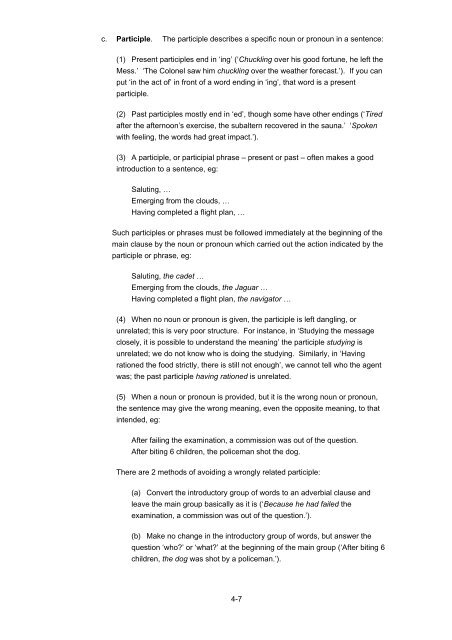Create successful ePaper yourself
Turn your PDF publications into a flip-book with our unique Google optimized e-Paper software.
c. Participle. The participle describes a specific noun or pronoun in a sentence:(1) Present participles end in ‘ing’ (‘Chuckling over his good fortune, he left theMess.’ ‘The Colonel saw him chuckling over the weather forecast.’). If you canput ‘in the act of’ in front of a word ending in ‘ing’, that word is a presentparticiple.(2) Past participles mostly end in ‘ed’, though some have other endings (‘Tiredafter the afternoon’s exercise, the subaltern recovered in the sauna.’ ‘Spokenwith feeling, the words had great impact.’).(3) A participle, or participial phrase – present or past – often makes a goodintroduction to a sentence, eg:Saluting, …Emerging from the clouds, …Having completed a flight plan, …Such participles or phrases must be followed immediately at the beginning of themain clause by the noun or pronoun which carried out the action indicated by theparticiple or phrase, eg:Saluting, the cadet …Emerging from the clouds, the Jaguar …Having completed a flight plan, the navigator …(4) When no noun or pronoun is given, the participle is left dangling, orunrelated; this is very poor structure. For instance, in ‘Studying the messageclosely, it is possible to understand the meaning’ the participle studying isunrelated; we do not know who is doing the studying. Similarly, in ‘Havingrationed the food strictly, there is still not enough’, we cannot tell who the agentwas; the past participle having rationed is unrelated.(5) When a noun or pronoun is provided, but it is the wrong noun or pronoun,the sentence may give the wrong meaning, even the opposite meaning, to thatintended, eg:After failing the examination, a commission was out of the question.After biting 6 children, the policeman shot the dog.There are 2 methods of avoiding a wrongly related participle:(a) Convert the introductory group of words to an adverbial clause andleave the main group basically as it is (‘Because he had failed theexamination, a commission was out of the question.’).(b) Make no change in the introductory group of words, but answer thequestion ‘who?’ or ‘what?’ at the beginning of the main group (‘After biting 6children, the dog was shot by a policeman.’).4-7
















